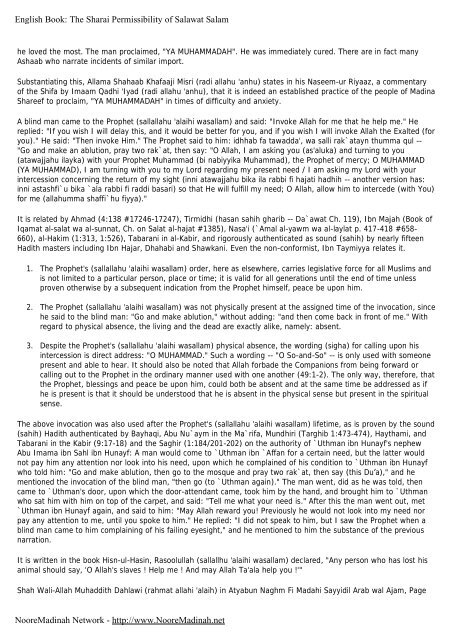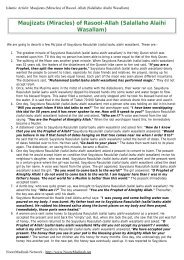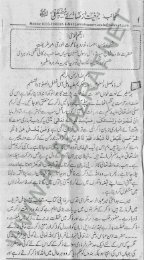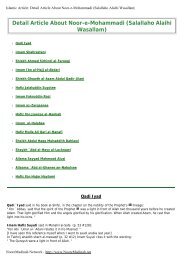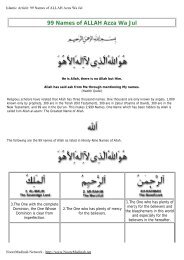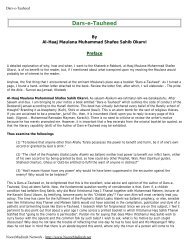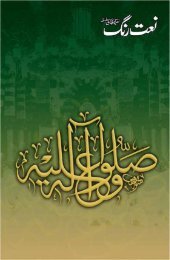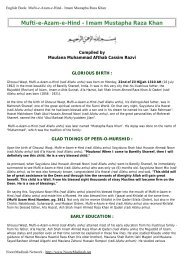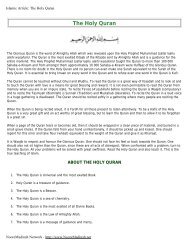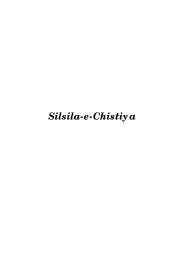The Sharai Permissibility of Salawat & Salam - Noore Madinah ...
The Sharai Permissibility of Salawat & Salam - Noore Madinah ...
The Sharai Permissibility of Salawat & Salam - Noore Madinah ...
You also want an ePaper? Increase the reach of your titles
YUMPU automatically turns print PDFs into web optimized ePapers that Google loves.
English Book: <strong>The</strong> <strong>Sharai</strong> <strong>Permissibility</strong> <strong>of</strong> <strong>Salawat</strong> <strong>Salam</strong><br />
he loved the most. <strong>The</strong> man proclaimed, "YA MUHAMMADAH". He was immediately cured. <strong>The</strong>re are in fact many<br />
Ashaab who narrate incidents <strong>of</strong> similar import.<br />
Substantiating this, Allama Shahaab Khafaaji Misri (radi allahu 'anhu) states in his Naseem-ur Riyaaz, a commentary<br />
<strong>of</strong> the Shifa by Imaam Qadhi 'Iyad (radi allahu 'anhu), that it is indeed an established practice <strong>of</strong> the people <strong>of</strong> Madina<br />
Shareef to proclaim, "YA MUHAMMADAH" in times <strong>of</strong> difficulty and anxiety.<br />
A blind man came to the Prophet (sallallahu 'alaihi wasallam) and said: "Invoke Allah for me that he help me." He<br />
replied: "If you wish I will delay this, and it would be better for you, and if you wish I will invoke Allah the Exalted (for<br />
you)." He said: "<strong>The</strong>n invoke Him." <strong>The</strong> Prophet said to him: idhhab fa tawadda', wa salli rak`atayn thumma qul --<br />
"Go and make an ablution, pray two rak`at, then say: "O Allah, I am asking you (as'aluka) and turning to you<br />
(atawajjahu ilayka) with your Prophet Muhammad (bi nabiyyika Muhammad), the Prophet <strong>of</strong> mercy; O MUHAMMAD<br />
(YA MUHAMMAD), I am turning with you to my Lord regarding my present need / I am asking my Lord with your<br />
intercession concerning the return <strong>of</strong> my sight (inni atawajjahu bika ila rabbi fi hajati hadhih -- another version has:<br />
inni astashfi`u bika `ala rabbi fi raddi basari) so that He will fulfill my need; O Allah, allow him to intercede (with You)<br />
for me (allahumma shaffi`hu fiyya)."<br />
It is related by Ahmad (4:138 #17246-17247), Tirmidhi (hasan sahih gharib -- Da`awat Ch. 119), Ibn Majah (Book <strong>of</strong><br />
Iqamat al-salat wa al-sunnat, Ch. on Salat al-hajat #1385), Nasa'i (`Amal al-yawm wa al-laylat p. 417-418 #658-<br />
660), al-Hakim (1:313, 1:526), Tabarani in al-Kabir, and rigorously authenticated as sound (sahih) by nearly fifteen<br />
Hadith masters including Ibn Hajar, Dhahabi and Shawkani. Even the non-conformist, Ibn Taymiyya relates it.<br />
1. <strong>The</strong> Prophet's (sallallahu 'alaihi wasallam) order, here as elsewhere, carries legislative force for all Muslims and<br />
is not limited to a particular person, place or time; it is valid for all generations until the end <strong>of</strong> time unless<br />
proven otherwise by a subsequent indication from the Prophet himself, peace be upon him.<br />
2. <strong>The</strong> Prophet (sallallahu 'alaihi wasallam) was not physically present at the assigned time <strong>of</strong> the invocation, since<br />
he said to the blind man: "Go and make ablution," without adding: "and then come back in front <strong>of</strong> me." With<br />
regard to physical absence, the living and the dead are exactly alike, namely: absent.<br />
3. Despite the Prophet's (sallallahu 'alaihi wasallam) physical absence, the wording (sigha) for calling upon his<br />
intercession is direct address: "O MUHAMMAD." Such a wording -- "O So-and-So" -- is only used with someone<br />
present and able to hear. It should also be noted that Allah forbade the Companions from being forward or<br />
calling out to the Prophet in the ordinary manner used with one another (49:1-2). <strong>The</strong> only way, therefore, that<br />
the Prophet, blessings and peace be upon him, could both be absent and at the same time be addressed as if<br />
he is present is that it should be understood that he is absent in the physical sense but present in the spiritual<br />
sense.<br />
<strong>The</strong> above invocation was also used after the Prophet's (sallallahu 'alaihi wasallam) lifetime, as is proven by the sound<br />
(sahih) Hadith authenticated by Bayhaqi, Abu Nu`aym in the Ma`rifa, Mundhiri (Targhib 1:473-474), Haythami, and<br />
Tabarani in the Kabir (9:17-18) and the Saghir (1:184/201-202) on the authority <strong>of</strong> `Uthman ibn Hunayf's nephew<br />
Abu Imama ibn Sahl ibn Hunayf: A man would come to `Uthman ibn `Affan for a certain need, but the latter would<br />
not pay him any attention nor look into his need, upon which he complained <strong>of</strong> his condition to `Uthman ibn Hunayf<br />
who told him: "Go and make ablution, then go to the mosque and pray two rak`at, then say (this Du’a)," and he<br />
mentioned the invocation <strong>of</strong> the blind man, "then go (to `Uthman again)." <strong>The</strong> man went, did as he was told, then<br />
came to `Uthman's door, upon which the door-attendant came, took him by the hand, and brought him to `Uthman<br />
who sat him with him on top <strong>of</strong> the carpet, and said: "Tell me what your need is." After this the man went out, met<br />
`Uthman ibn Hunayf again, and said to him: "May Allah reward you! Previously he would not look into my need nor<br />
pay any attention to me, until you spoke to him." He replied: "I did not speak to him, but I saw the Prophet when a<br />
blind man came to him complaining <strong>of</strong> his failing eyesight," and he mentioned to him the substance <strong>of</strong> the previous<br />
narration.<br />
It is written in the book Hisn-ul-Hasin, Rasoolullah (sallallhu 'alaihi wasallam) declared, "Any person who has lost his<br />
animal should say, 'O Allah's slaves ! Help me ! And may Allah Ta'ala help you !'"<br />
Shah Wali-Allah Muhaddith Dahlawi (rahmat allahi 'alaih) in Atyabun Naghm Fi Madahi Sayyidil Arab wal Ajam, Page<br />
<strong>Noore</strong><strong>Madinah</strong> Network - http://www.<strong>Noore</strong><strong>Madinah</strong>.net


